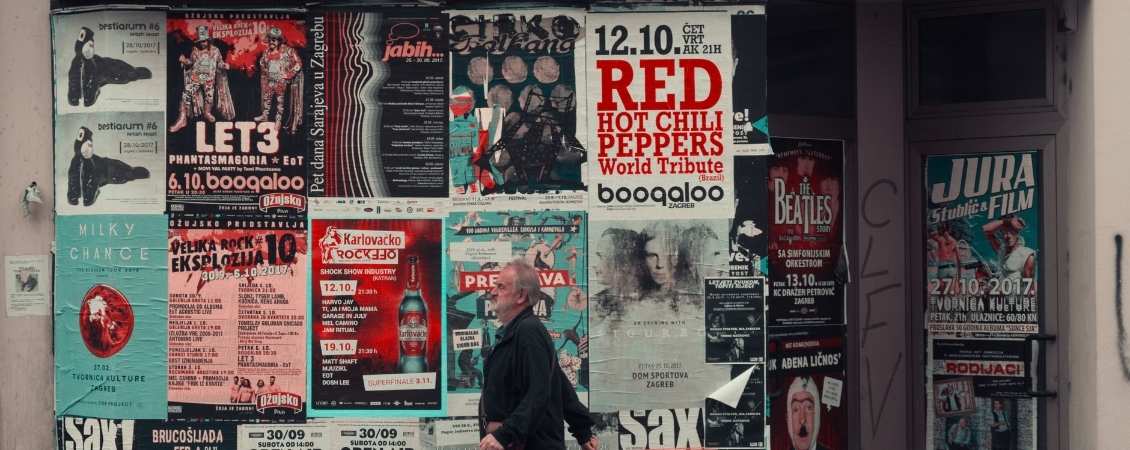No matter whether you’re hosting a launch party for your new offerings or opening a new premises for your business, a great way to start building momentum for long term success is by hosting an event.
Many businesses up and down the country are taking advantage of events to help them achieve their business objectives, whether that be to boost brand exposure in an area, or increase revenue. With this in mind, we’ve put together our top tips to help you successfully promote your event!
When Should I Promote My Event?
The first question many people ask themselves when starting the planning process is “When should I start promoting my event?” The answer to this is variable, depending on the size of the event, if you’re planning on keeping it fairly small, you can consider shorter timeframes than an event which will include a large number of attendees.
The event management and ticketing service, Eventbrite, recommends that you start promoting your event 16 weeks in advance, with a soft launch including the date and time. This will help you understand how much interest you’ve got and help you negotiate with suppliers to ensure that you have everything needed to help the day run smoothly.
You could also consider sending out personalised invites to regular or high value customers before making your event public, which could lead to higher levels of engagement from them feeling recognised and appreciated. After a limited exclusivity period, you may want to promote your event on social media and through print to boost visibility and pique the curiosity of those who see the content.
How to Promote an Event
No matter if you’re promoting an event for the first time, or diving into event management after a hiatus, you want to ensure that everything runs smoothly. We’ve created 6 steps you can follow to make the process easier for you.
1. Defining Your Target Audience
The first step is to ensure that you’ve identified and defined your target audience. Although it may feel like a large number of attendees is beneficial, if there are low levels of engagement on the day, you’re not as likely to see as much success as a smaller event with the majority of people interested in what’s going on.
You could start defining your target audience by referring to your business plan, if you’ve got one already, as your market analysis will provide an overview of your business’s target audience as a great refresher. Alternatively, you could consider the following criteria -
- Age range
- Gender
- Location
- Income
- Interests and hobbies
- Consumption habits
- Buying behaviours
Doing this will help you obtain a deeper understanding of the types of people you’re looking to see at your event, helping you create a persona which you can personalise your marketing towards.
2. Setting Clear Goals
Once you understand the types of people you’re looking to attend your event, it’s time to ensure that you’ve got clear goals set. Research from the University of Salford indicates that those who set goals are 10 times more likely to succeed than those who don’t. With this in mind, there are clear benefits to taking the time to check that your goals are clear, so we suggest writing them using the SMART goal format, which you can read our guide here.
Your goals may include -
- Having X number of attendees
- Achieving £X revenue within 6 months of the event
- Increasing brand awareness leading to X number of new customers within 12 months
- Generating X new leads on the day of your event
3. Selecting Your Promotion Channels
Just like with any form of promotional activity, choosing the right channels is a key factor to the success of your event. It’s important to ensure that you take the time to consider which channels will be most effective, based on the target audience and goals which you recently identified.
A great way to select your promotion channels is to make a note of all available options, along with looking at similar events which have been done in the past. You might even look to complete a SWOT analysis to uncover which choice is the most beneficial. Common promotional channels include -
- Social media - key platforms include Facebook, LinkedIn, Twitter (X), Instagram and TikTok
- Email marketing - such as customers who have shown interest and those who have already purchased tickets
- Content marketing - including blogs, articles and videos
- Paid advertising - you could consider influencer marketing, sponsored ads on social media, and PPC (pay per click) ads on search engines
Another great idea is to share your event organically by engaging with your employees and customers who care about your business, as they’ll be able to share information on their platforms and through word of mouth.
Taking the time to uncover the right channels will help you ensure that you’re focusing on promoting your event in the right places, saving you time and money, so you can achieve maximum success from your event.
4. Creating a Promotional Calendar
As we’ve recently discovered, you’ll likely spend a few months promoting your event before the launch. To help you ensure you stay on track with your goals, and make them easier to monitor, it could be worth creating a promotional calendar.
Building your calendar doesn’t have to be overcomplicated, so to get started with this, you might want to break it down into three key areas -
- Pre event - building anticipation, engagement and ticket sales or attendee uptake
- Mid event - encouraging participation at the event, social media sharing and excitement
- Post event - sharing highlights, testimonials and teasers for future events
By spending the time to break this down, you’ll be able to focus your efforts in the right places, building the content and curating the relevant messaging. This could also be a great help if you’re planning on scheduling any posts on social media in advance, or ensure that your physical marketing material is received or ready to go on time.
5. Building Your Team
For your event to be a success, you’ll want to see high levels of engagement throughout, so it’s important to ensure that you build the right team for the job. Whether you’re looking to include street marketing teams who distribute leaflets or delegate your social media efforts to somebody, it will likely prove beneficial if they’re all heavily engaged, as this will reflect onto the audience.
To get started building your team, you could look at your existing employees and make the most of their skills. If you don’t have a team, you could look to onboard an events management agency who has experience in planning and promoting events, who you can learn from ready for the future.
However you decide to build your team, it’s important to keep them in the loop of any adjustments to your promotional calendar, feedback obtained and actions taken. This will help ensure that there is a consistent feedback loop to encourage success and ideas to make your event the best it can be. It’s also worth bearing in mind that you should take the time to show appreciation for your team, you could think about organising a dinner or gift when the event has finished as a way to thank everyone for their efforts.
6. Monitoring and Adjusting
Just like any form of promotion, managing an event is an ongoing process, so by regularly monitoring your efforts using defined metrics and analytics tools, you can ensure that you’re optimising your performance.
Key areas to keep your eye on include -
- Ticket sales
- Website traffic
- Social media engagement
- Email campaign statistics
- ROI on PPC ads
The information you collect can help you manage and adjust your strategy as necessary with data driven decisions that increase the chances of success from your promotional activity. We know that it can feel like a lot to monitor, however, you could consider delegating channels to trusted members of your team to help collate information. On the back of this, you could hold regular meetings in which you digest the findings and make decisions as a collective, so everyone feels involved.
How to Promote an Event on Social Media
With Statista data showing that there are 5.35 billion internet users worldwide, and 5.04 billion are on social media, there’s clear evidence that there are huge benefits to promoting on these platforms. From creating an event on Facebook, to creating captivating content on Instagram, social media is one of the most effective methods for reaching your target audience, however, it’s important that your efforts are focused.
Key elements you may want to consider when promoting your event on social media include -
- Which platforms are your target audience most active on?
- Have you already built a community of loyal followers on any platform?
- What Call to Action will inspire attendance?
- How can you make it easy for your audience to take action - with links, stickers and buttons?
- Should you include any sponsored posts?
When using social media, it’s important to put emphasis on “social”, so it’s important to try and find the time to monitor the engagement from the moment you launch your event to the discussions taking place post event. Attendees will want to feel listened to and part of the conversation, so by addressing questions and responding to mentions, you’ll provide an engaging environment throughout, ultimately leading to success.
Our top tip would be to continue promoting your event on the day to increase the chances of your target audience attending future events, that may have been tentative. An easy way to do this would be in the form of stories on platforms like Facebook and Instagram. Doing this you can showcase the event in full swing, showing off the different stalls and promotions throughout the day, ultimately leading to FOMO (fear of missing out) for your next event.
How to Promote an Event with Print
Print marketing is a traditional form of promotion which can be extremely targeted and impactful. Data obtained by Harvard Business Review shows that customers trust traditional marketing including print and direct mail, which evidences that by distributing tangible material, you’re increasing the chances of making your event a success!
Common forms of print used to promote events include -
- Flyers - allowing you to distribute information in person on the go, or through the post
- Invitations - giving you a great way to invite your most valued customers in a way which feels exclusive and personal
- Posters - ideal for advertising details around the vicinity of your business and the venue
- Stapled books - great for creating programmes and information laying out the event schedule
- Note cards - providing you with a great way to thank your customers for attending, and keep your business at the forefront of their mind
We would suggest that you consider each stage of your event, from pre to post event, so you can capture the imagination of your customers, including print they can keep as a memory of the day.
How to Promote an Event Through Email
The rise of digital communication led to email being a useful marketing channel for promoting events. Hubspot data suggests that the average open rate for an email is 46-50% giving you up to a 1 in 2 chance of reaching your target customer. With this in mind, you can make the most of your email marketing activity by considering the following actions -
- Create engaging content - by ensuring that your content is exciting and provides value for the reader, you’ve got more chance of encouraging your customers to attend and share the details of your event. Great areas to consider include the subject lines you use, the images included and how clear your call to actions are
- Segment your emails - many email marketing providers provide you with tools which make it easier to send emails to specific customers based on parameters which you set. You might want to consider factors including location, engagement history and whether they’ve already bought a ticket
- Create automated emails - another tool which many email marketing providers offer allows you to create and schedule emails to reach customers at specified times. This can help save time in the long run, as you can batch create your emails and monitor them using various analytics tools. Our top tip would be to consider creating automated emails which trigger based on different areas of the customer journey, for example, a customer who’s attending could receive reminders and speaker updates each week leading up to the event
When promoting your event through email, we would suggest that you make sure you’re including personalisation in your messaging. You don’t need to overthink this aspect, but by addressing your recipients by their first names and sending them relevant emails based on their interactions, you’re able to increase engagement levels, leading to a better chance of hosting a successful event.
Obtaining Feedback Ready for Your Next Event
No matter how you feel the event went on the day, it’s always worth ensuring that you obtain feedback from as many attendees as possible so that your next event is even better! You could consider including a QR code on your flyers and roller banners which directs people to a feedback page where they’re able to provide information on what went well and what may be improved.
Research shows that offering an incentive to participate in your survey can increase the likelihood of completion by 30%. This doesn’t have to be too costly for you, as you could consider offering vouchers to use at your business to hampers and gift cards.
It’s important to take the time to analyse and understand the feedback you receive, this will help you ensure that your next event keeps what went well, and you can improve on aspects which attendees did not enjoy as much. Should you implement your feedback, you’re more likely to succeed at future events, which will lead to a much better perception of your business and positive engagement, while building brand advocates due to attendees feeling heard.
In Conclusion
Promoting an event is a great way to help push you towards reaching your business goals and it’s important to measure success against your objectives. By planning in advance and considering everything from the lead up to the event, to following up when the event is over and obtaining feedback, you’ll be able to ensure you’re increasing your chances of success.


.jpg)


